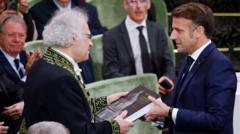Established by Cardinal Richelieu in 1635, the Académie's mandate was initially to ensure the purity and eloquence of the French language. However, the daunting task of compiling its comprehensive dictionary has proven sluggish, with only the last section, from R to Z, completed after additional decades of effort. While lauded as a reflection of contemporary French society from the 1950s onward, the latest edition interestingly omits terms like “smartphone” and “vlog,” raising eyebrows about its efficacy.
In a recent commentary by a group of linguists, the prolonged process was deemed “excessively tardy” and “perfectly useless,” indicating that the traditional dictionary's relevance is under scrutiny. They pointed to the ever-evolving language circulating in today's digital age, contrasting it with the Academy's outmoded inclusions, which now comprise more than just modern vocabulary.
Among the notable additions, there are feminine forms for traditionally male-dominated professions. Still, critics have pointed out that early sections of the dictionary remain antiquated due to the Academy's initial resistance to such changes. For example, the definition of marriage maintains a conservative viewpoint inconsistent with contemporary societal norms.
The dictionary committee, led by Amin Maalouf, convenes weekly to discuss definitions proposed by external experts. This ongoing dialogue signifies the Academy's commitment to linguistic accuracy, yet the broader concerns regarding the dictionary's adaptability in the face of rapid linguistic transformation loom large.
As conversations about the potential tenth edition begin, many wonder if the Académie Française will embrace the frenzy of modern language evolution or remain enshrined in its historic past.
In a recent commentary by a group of linguists, the prolonged process was deemed “excessively tardy” and “perfectly useless,” indicating that the traditional dictionary's relevance is under scrutiny. They pointed to the ever-evolving language circulating in today's digital age, contrasting it with the Academy's outmoded inclusions, which now comprise more than just modern vocabulary.
Among the notable additions, there are feminine forms for traditionally male-dominated professions. Still, critics have pointed out that early sections of the dictionary remain antiquated due to the Academy's initial resistance to such changes. For example, the definition of marriage maintains a conservative viewpoint inconsistent with contemporary societal norms.
The dictionary committee, led by Amin Maalouf, convenes weekly to discuss definitions proposed by external experts. This ongoing dialogue signifies the Academy's commitment to linguistic accuracy, yet the broader concerns regarding the dictionary's adaptability in the face of rapid linguistic transformation loom large.
As conversations about the potential tenth edition begin, many wonder if the Académie Française will embrace the frenzy of modern language evolution or remain enshrined in its historic past.


















